Monday, August 13, 2007
Giving access to the power of the printed word
In traveling through the central Venezuelan state of Aragua I had noticed a number of buildings with the term "Bibliotecas Virtuales" (virtual libraries) on them. While walking through the winding streets of a small costal town I again saw one:
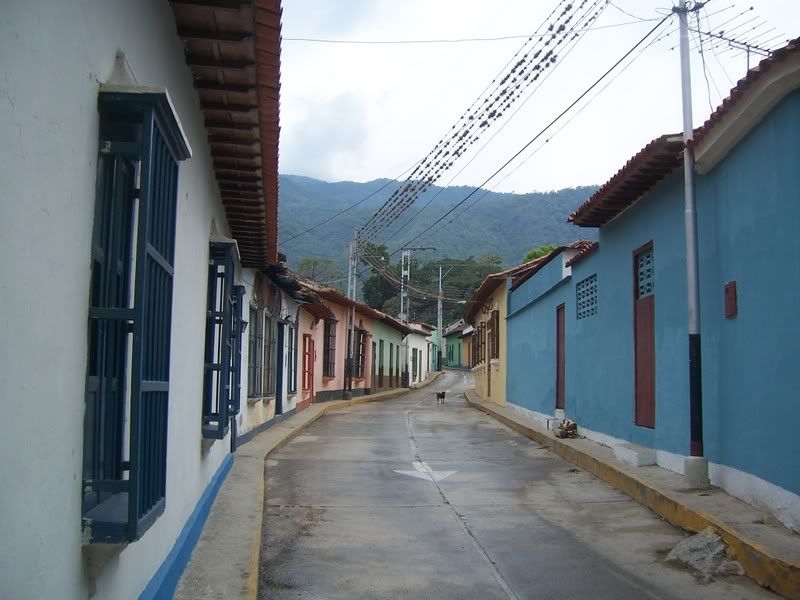
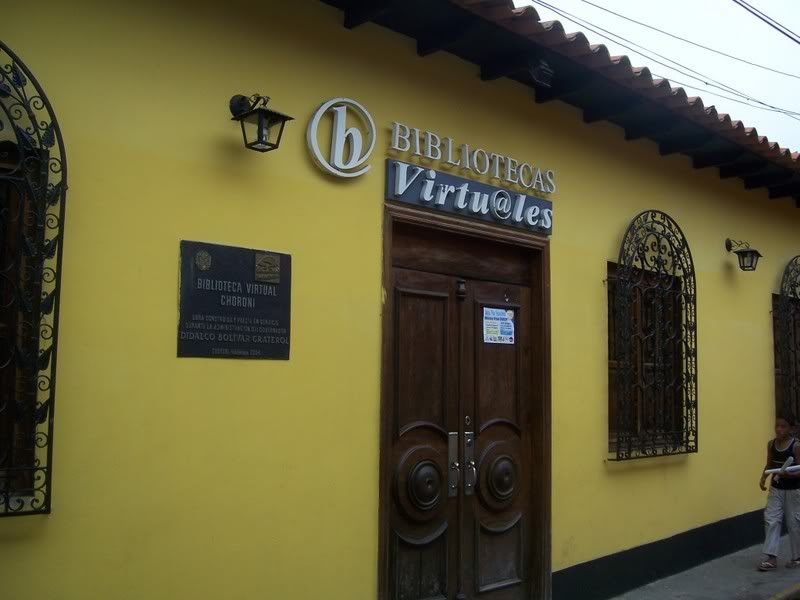
Curious about what these places that I keep running across are I decided to go inside.
What I found a a government financed computer and internet center.
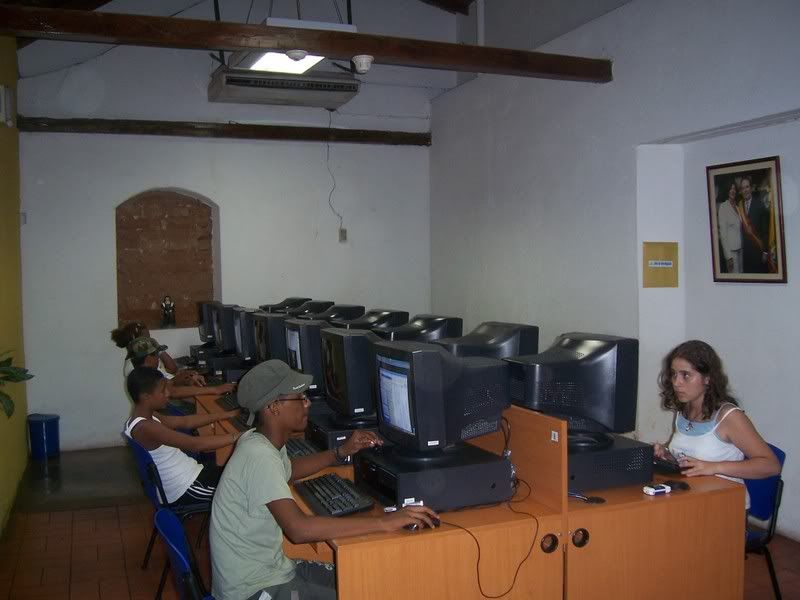
There were 14 computers available for the use by the general public. They had full internet access, the normal office software that people use, and printers. They also had high speed internet connections. Best of all, they are free, even for a gringo passersby.
Happy to sate my internet addiction I sat down and surfed for a while. Low and behold the internet connections are unrestricted, other than a sign saying they didn't want people accessing pornographic sites. But I did easily access sites such as Noticiero Digital and Globovision so obviously there is no restriction on political pornography.
Turns out there are scores of these sites throughout Aragua and they have been built and paid for by the state government, not the central government. Nationwide hundreds of similar sites have been built by the central government and are called "Info Centros" which I did see poor areas of Caracas such as El Valle and Antimano while I was there.
It is nice to see the Venezuelan government devoting resources to making sure even low income Venezuelans have access to computers and all the free and unrestricted information found on the internet. This clearly shows that rather than restricting peoples freedoms, as anti-Chavez propogandists often maintain, the Chavez government is expanding peoples access to information.
Having said this, I am not the biggest fan of just giving people access to computers and the internet. I don't think they are always the best teaching tool. Often Guttenberg's little invention is better. So it was good to see that this "Virtual Library" was something more than just a free government sponsored internet cafe.
It also had a nice open air room that was used as a classroom:
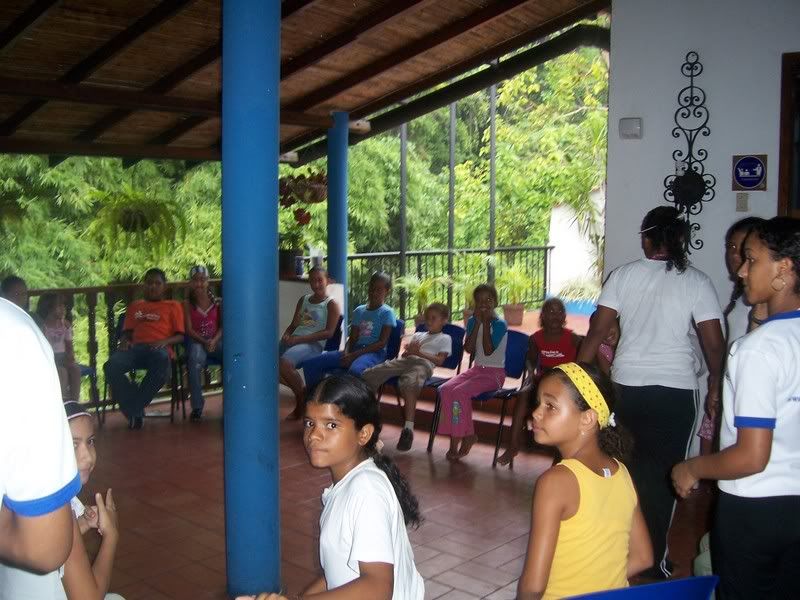
Given that this is August Venezuelan school children are on vacation. However this center was open to the children of the town they are given educational activities to both keep them busy and further their learning even when they aren't in class. Here they were playing a game involving spelling.
Better still, downstairs there was an actual library:
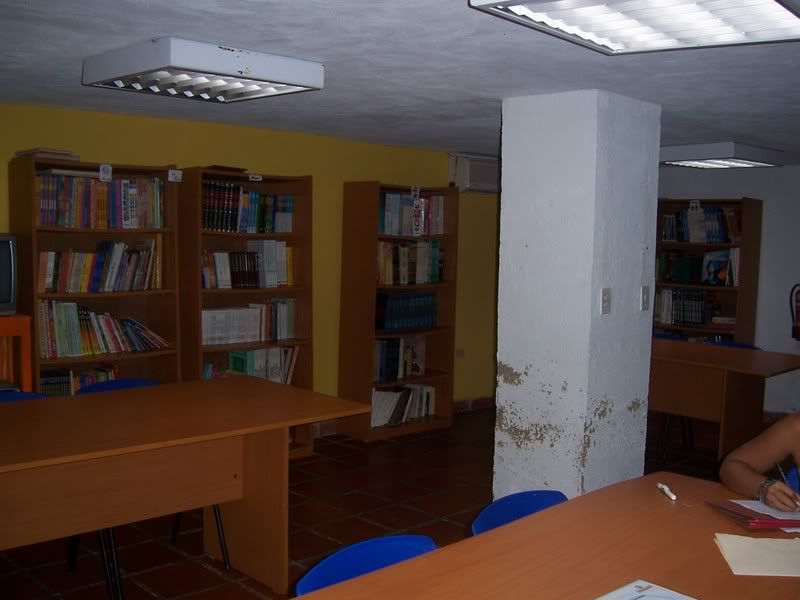
The library was small but well stocked, with an ample supply of things such as encylopedias. It also served as a quite study space which is important given that many Venezuelan homes are often crowded and noisy. It was also nice to see that this facility had long hours, from 9 a.m. to 9 p.m., even when school is not in session.
All in all the construction of these libraries throughout Venezuela seems like a fabulous idea and I am surprised they haven't received mention in media reports that come out of Venezuela. Then again, most foreign reporters in Venezuela seem more interested in talking about mythical Hummers than the countries expansive social programs.
Oh, and while on the subject of Hummers I finally did see one and manage to get my camera out and snap a picture of its butt before it drove away:
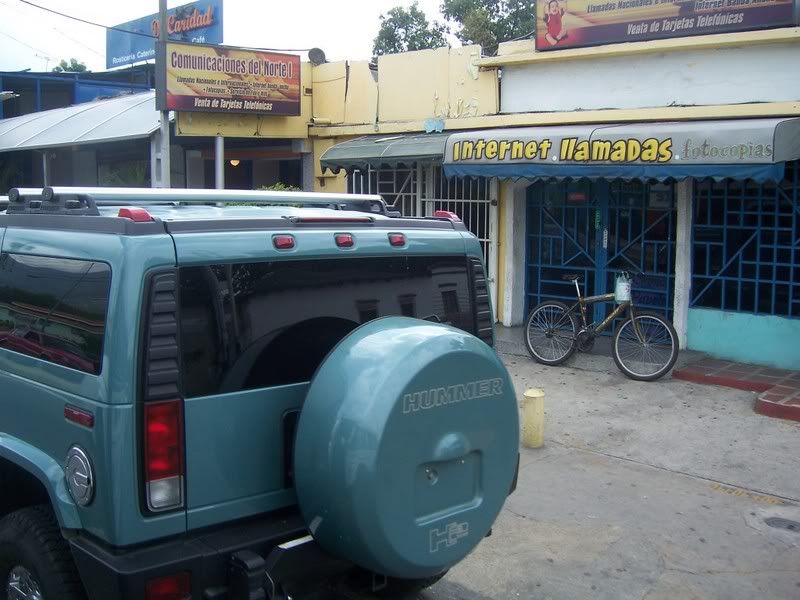
Ok, ok, I can hear it now - "That isn't a real Hummer, that is a crappy little Hummer 2". I know it is. But after a week and a half of going all over the place in a fruitless search for this things I'll take anything I can find.
But this does bring up an interesting point. In New York City one can easily see a half a dozen Hummers each day without even looking for them yet at the same time branch libraries have been closed or had their hours scaled back. In Venezuela, by contrast, the ostentatious luxury of Hummers is very rare yet new libraries are sprouting up like mushrooms after a rain all over the country. You would never know this listening to the anti-Chavez hacks but it is certainly true. And I think it says something about the difference in people's priorities in New York and peoples priorities in Venezuela.
It is also ironic how New York Times reporters, who should be familiar with both places, never seem to pick up on this contrast.
|


Curious about what these places that I keep running across are I decided to go inside.
What I found a a government financed computer and internet center.

There were 14 computers available for the use by the general public. They had full internet access, the normal office software that people use, and printers. They also had high speed internet connections. Best of all, they are free, even for a gringo passersby.
Happy to sate my internet addiction I sat down and surfed for a while. Low and behold the internet connections are unrestricted, other than a sign saying they didn't want people accessing pornographic sites. But I did easily access sites such as Noticiero Digital and Globovision so obviously there is no restriction on political pornography.
Turns out there are scores of these sites throughout Aragua and they have been built and paid for by the state government, not the central government. Nationwide hundreds of similar sites have been built by the central government and are called "Info Centros" which I did see poor areas of Caracas such as El Valle and Antimano while I was there.
It is nice to see the Venezuelan government devoting resources to making sure even low income Venezuelans have access to computers and all the free and unrestricted information found on the internet. This clearly shows that rather than restricting peoples freedoms, as anti-Chavez propogandists often maintain, the Chavez government is expanding peoples access to information.
Having said this, I am not the biggest fan of just giving people access to computers and the internet. I don't think they are always the best teaching tool. Often Guttenberg's little invention is better. So it was good to see that this "Virtual Library" was something more than just a free government sponsored internet cafe.
It also had a nice open air room that was used as a classroom:

Given that this is August Venezuelan school children are on vacation. However this center was open to the children of the town they are given educational activities to both keep them busy and further their learning even when they aren't in class. Here they were playing a game involving spelling.
Better still, downstairs there was an actual library:

The library was small but well stocked, with an ample supply of things such as encylopedias. It also served as a quite study space which is important given that many Venezuelan homes are often crowded and noisy. It was also nice to see that this facility had long hours, from 9 a.m. to 9 p.m., even when school is not in session.
All in all the construction of these libraries throughout Venezuela seems like a fabulous idea and I am surprised they haven't received mention in media reports that come out of Venezuela. Then again, most foreign reporters in Venezuela seem more interested in talking about mythical Hummers than the countries expansive social programs.
Oh, and while on the subject of Hummers I finally did see one and manage to get my camera out and snap a picture of its butt before it drove away:

Ok, ok, I can hear it now - "That isn't a real Hummer, that is a crappy little Hummer 2". I know it is. But after a week and a half of going all over the place in a fruitless search for this things I'll take anything I can find.
But this does bring up an interesting point. In New York City one can easily see a half a dozen Hummers each day without even looking for them yet at the same time branch libraries have been closed or had their hours scaled back. In Venezuela, by contrast, the ostentatious luxury of Hummers is very rare yet new libraries are sprouting up like mushrooms after a rain all over the country. You would never know this listening to the anti-Chavez hacks but it is certainly true. And I think it says something about the difference in people's priorities in New York and peoples priorities in Venezuela.
It is also ironic how New York Times reporters, who should be familiar with both places, never seem to pick up on this contrast.
|
